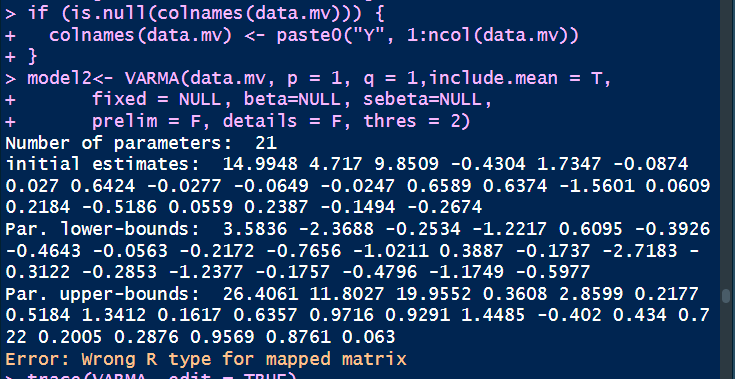I want to solve my problem I couldent found Varmax function could you help me
Look up the teradata package to see if it helps.
install the "astsa" package ----
install.packages('astsa')
library(astsa)
#Load the data set, and parametrize the different set sizes.----
lap_df <- as.data.frame(lap)
nData <- nrow(lap_df)
nShortData <- nData - 52
#Add "seqid" and "id" columns to prepare the data frame for use with the VARMAX function----
seqid <- rep(1, nData)
id <- seq(1:nData)
lap_df_indexed <- cbind(seqid, id, lap_df)
#Create a table in the database to hold the data.
install.function('copy_to')
install.packages("dplyr")
install.packages("dbplyr") # For database interaction
install.packages("DBI") # For database connections
install.packages("RSQLite") # Example database backend
library(dplyr)
library(dbplyr)
library(DBI)
library(RSQLite)
help('copy_to')
??copy_to
con <- DBI::dbConnect(RSQLite::SQLite(), ":memory:")
copy_to(con, lap_df_indexed, name="lap_data", overwrite=TRUE)
#Create a tibble for the main data set.
tddf_lap_data <- tbl(con, "lap_data")
#Obtain the shortened data by using the first nShortData
df_lap_data <- as.data.frame(tddf_lap_data)
df_lap_data_short <- df_lap_data[1:nShortData,]
copy_to(con, df_lap_data_short, name="lap_data_short", overwrite=TRUE)
tddf_lap_data_short <- tbl(con, "lap_data_short")
#Perform the VARMAX analysis with
help.search("td_varmax_mle")
install.packages("sos")
library(sos)
install.packages("astsa")
library(astsa)
library(devtools)
lap_varmax <- td_varmax_mle(
data = tddf_lap_data_short,
response.columns = c("cmort","tempr","part"),
partition.columns = c("id"),
orders = "1, 0, 1",
step.ahead = 52,
data.partition.column = c("seqid"),
data.order.column = c("id")
)
these codes from terar data it give me error
Error in td_varmax_mle(data = tddf_lap_data_short, response.columns = c("cmort", :
could not find function "td_varmax_mle"
You don't seem to have installed a package that includes td_varmax_mle. The function is mentioned in teradata, but the documentation I found is a little odd so I don't know if it will help.
i cand found function while i was installed the package
Which package did you install that includes the function?
Many packages
astata
Vars
MTS
MARRS
I searched from chat Gpt any thing written I installed but it doesn't work
Also I am work on varmax for the first time so I can fixed
? If I can't how should I do
Do any of those packages do VARMAX? My guess is "no," but I don't know for sure.
I need for my master
It is possible that you need to use a different piece of software.
It is my impression that VARMAX models are not widely used, so you might consider an alternative such as VARX.
Or you might just do equation-by-equation ARMAX which will give you basic VARMAX estimates. You might have to do some more work then to use the estimates.
I want to forecast my data,
Can I use matlab or python which one give me correct varmax model for forcasting
I believe you can do it in Python. Not sure about Matlab. Or you could forecast with equation-by-equation ARMAX in R with a little extra work.
it means i cant do it by R at all , no one didi it by R
hello sir,
i am really sorry to take your time , I have found VARMA model and just for 2Y i have 3Y and the Error is attached below also i attached my code ,
could you please help me?
I will be very happy to see the results.
(Attachment varmax learn.R is missing)
(Attachment learn2.R is missing)
It may help if you can post a reprex.
Hello sir,
could you check this for me? i want to know if I can use this as Varmax Function
install.packages("MARSS")
library(MARSS)
Simulate multivariate time series
set.seed(123)
n <- 100
exog <- 0.5 * (1:n) + rnorm(n, 0, 1) # Exogenous variable
Generate two time series with ARMA structure
series1 <- arima.sim(list(order = c(1, 0, 1), ar = 0.5, ma = -0.4), n = n)
series2 <- arima.sim(list(order = c(1, 0, 1), ar = 0.4, ma = 0.3), n = n)
Combine data into a matrix
Y <- rbind(series1, series2)
Exogenous variable
X <- matrix(exog, nrow = 1, ncol = n)
Define MARSS model structure
model_list <- list(
B = "unconstrained", # AR component (VAR)
U = "zero", # No deterministic trend
Q = "diagonal and unequal",# State noise covariance
Z = diag(2), # Observation matrix
A = "zero", # No intercept in observation equation
R = "diagonal and unequal",# Observation noise covariance
C = matrix(1, nrow = 2), # Exogenous coefficient matrix
c = X # Exogenous variable
)
Fit the MARSS model
fit <- MARSS(Y, model = model_list)
Summarize results
summary(fit)
I haven't used that package, so I can't advise. You've set up some trial data and estimated it. Did you get back the right values for the coefficients?
I don't know the values right,
Thanks for your support, I should study more on it
